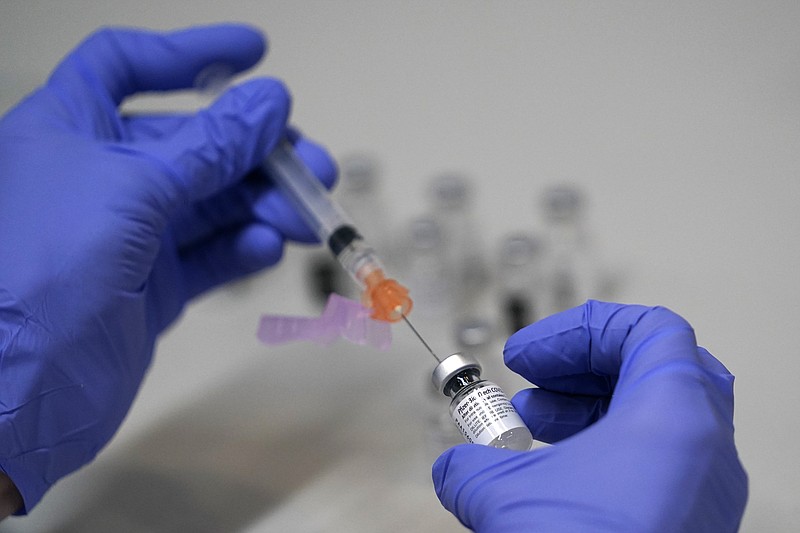Pfizer or Moderna coronavirus vaccine booster doses are now available for Cole County residents who have severe underlying health conditions.
If a patient has undergone a solid organ transplant or has a diagnosis of a condition that is considered to have an equivalent level of compromised immunity, they may receive the third dose 28 days or more after completing the first two doses, according to a news release from Cole County Health Department Director Kristi Campbell.
Patients receiving a third dose should receive the same vaccine they received for the first two doses.
It is estimated 2.7 percent of the U.S. adult population is considered at this level of an immunocompromised state.
Examples of disease states and medications that would qualify include:
- Solid tumor and hematologic (blood) malignancies,
- Receipt of solid-organ or hematopoietic (blood producer) stem cell transplant,
- Severe primary immunodeficiencies,
- Persons living with HIV,
- Treatment with immunosuppressive medications such as cancer chemotherapeutic agents, TNF (tumor necrosis factor) blockers (substances that suppress the immune system), certain biologic agents (e.g. rituximab) and high-dose corticosteroids. Examples of patient diagnoses receiving these medications include multiple sclerosis, colitis, rheumatoid arthritis, lupus and psoriasis.
- Chronic renal disease.
- Patients without a spleen.
There is no current recommendation for those who have received the Johnson & Johnson vaccine.
Patients should contact their physician or health care provider if they believe they have a condition that qualifies for a third shot. Third shots are available at Capital Region Medical Center, St. Mary's Hospital, Jefferson City Medical Group and the Community Health Center of Central Missouri.
The Cole County Health Department does not offer third-dose booster shots.
More information about who should receive booster shots at this time may be found on the Centers for Disease Control and Prevention website: cdc.gov/coronavirus/2019-ncov/vaccines/recommendations/immuno.html.
Positive COVID-19 cases in Cole County were slightly down last week, and as of Monday, the number of positive cases statewide was trending down, Campbell told county commissioners Tuesday.
"It will take a little while for the hospitalizations to catch up, so hopefully we've turned the corner and positive cases will continue to decline," Campbell said.
Campbell said Capital Region reported 26 COVID-19 patients Monday and St. Mary's had 41, which officials there said was nearing the highest numbers they have had. Some of these patients are in isolation and some are out.
"The hospitals also reported that 80-85 percent of the COVID patients they had were unvaccinated," Campbell said. "There have been a lot of reports nationally that 97-99 percent of those with COVID in hospitals are unvaccinated, but that's not the case in Cole County. That might have been true for us a couple of months ago, but we are seeing the number of vaccinated people get sick and be hospitalized increase.
"We don't know what's causing that," she said. "There's a lot of theories, but about 20 percent of the cases we receive on a daily basis are breakthrough cases. Those traveling have a higher risk of getting the virus so those getting in a last-minute trip before school does scare me."
Campbell also said they are still doing antibody testing for those who want to see if they have the antibodies for COVID-19.
"We offer them at the health department for $20," Campbell said. "It's a finger poke and takes about 15 minutes."
Campbell said along with their COVID activities, the health department staff has been busy the past few weeks with immunizations for children going back to school.
"We've been working with the schools for almost two years now on COVID matters, and we developed a framework for how they can operate during a pandemic," Campbell said. "Once we worked with them to develop guidelines, we left it up to the individual school boards as to how they operated. It depends on what's happening with the virus in their school environment and not every school will have the same situation."
Campbell asked that residents have patience with the school districts because, "Like us, they're in a difficult spot. No matter what decision they make people are going to be angry because it's become very polarizing and controversial. We are doing the best we can based on the science that's out there and based on what we learned last year when we had kids in school when a lot of districts did not.
"We learned that kids don't transmit the virus as well as adults," Campbell added. "We also learned that by quarantining all those kids, very rarely did it result in a positive case. Most of the exposure that resulted in positive cases was household exposure - not school exposure."
Campbell also said, "We're going to support the schools, the parents, the faculty and the kids as best we can. We're not here to second-guess their decisions."
News Tribune reporter Joe Gamm contributed to this report.

